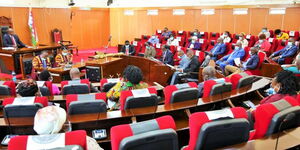Over 1,000 Chief Executive Officers (CEOs) have expressed concerns over the government's abrupt changes in tax structures and policies, warning that such unpredictability could hinder Kenya's expected economic growth in 2025.
In a survey conducted by the Central Bank of Kenya (CBK) and published on Tuesday under the CEO's Survey, business leaders shared recommendations to the government urging its head to create certainty around taxation.
The CEOs, primarily drawn from key private sector organizations, including the Kenya Association of Manufacturers (KAM), the Kenya National Chamber of Commerce and Industry (KNCCI), and the Kenya Private Sector Alliance (KEPSA), argued that frequent changes to tax structures create uncertainty, dampening investor confidence and economic growth.
The concerns came following projections by the chief of companies over the possibility of an economic turnaround that could see the country create more jobs for its citizens.
The CEOs revealed in the survey, titled the Chief Executive Officers' Survey, that the growth is expected to be supported by expectations of favourable weather conditions and macroeconomic stability (stability of the shilling, declining interest rates, and low inflation).
They argued that the cost of doing business remained a concern mainly due to the uncertainty in the taxes.
Since President William Ruto took office in 2022, Kenyans have experienced abrupt changes in taxation and statutory deduction policies including those on affordable housing, the Social Health Authority (SHA), and adjustments to the National Social Security Fund (NSSF), among others.
Following the introduction of SHA, the government set the monthly deductions at 2.75 per cent of the gross salary.
Kenyans from the informal sector or without employment contributions were set at Ksh300 per month to get the services.
In December last year, Ruto signed a key business law that capped the NSSF contributions at Ksh4,320, up from Ksh2,160.
Following a High Court ruling upholding the Affordable Housing Act, of 2024, the new rates were set at 1.5% of an employee's gross salary or gross income for self-employed individuals.
Additionally, employers are required to match this contribution with another 1.5%, bringing the total deduction to 3% per employee.
These policy changes have sparked mixed reactions among Kenyans, with debates continuing over their impact.
Further, the CEOs challenged the government to implement policies that promote lending to businesses as firms continued facing challenges accessing credit, despite the declining interest rates.












